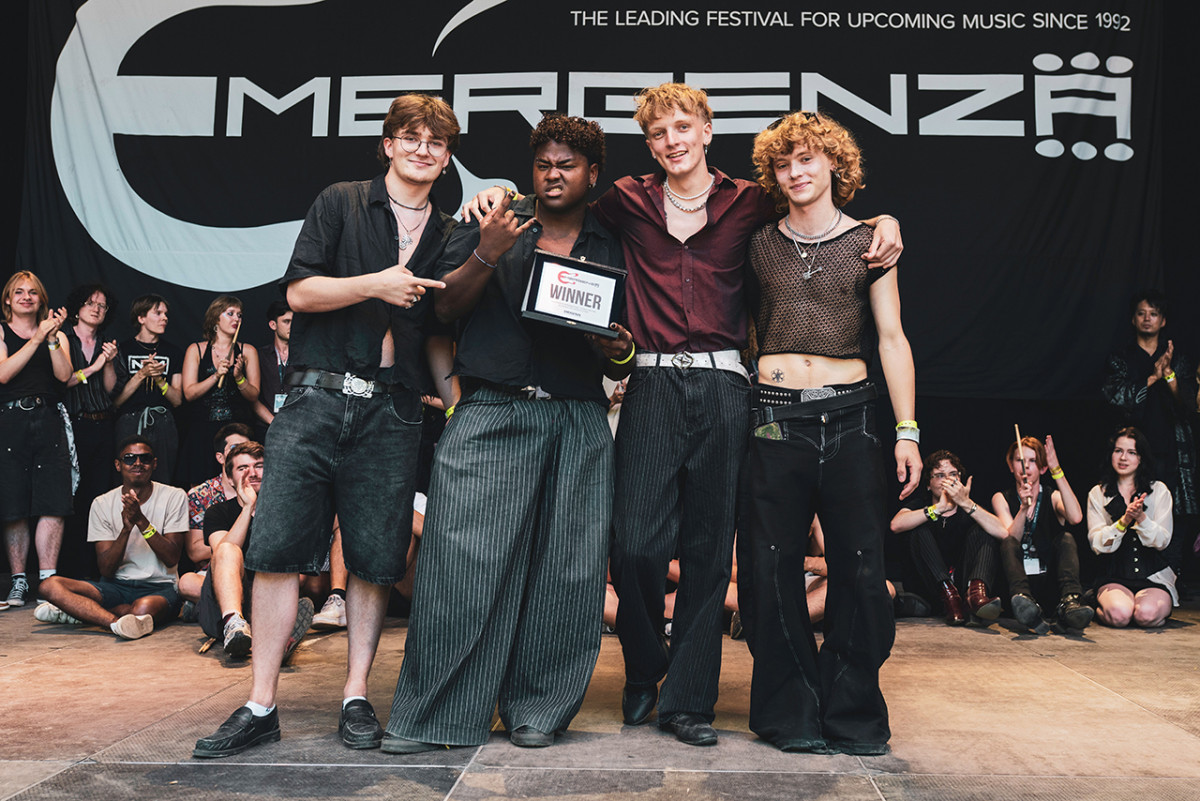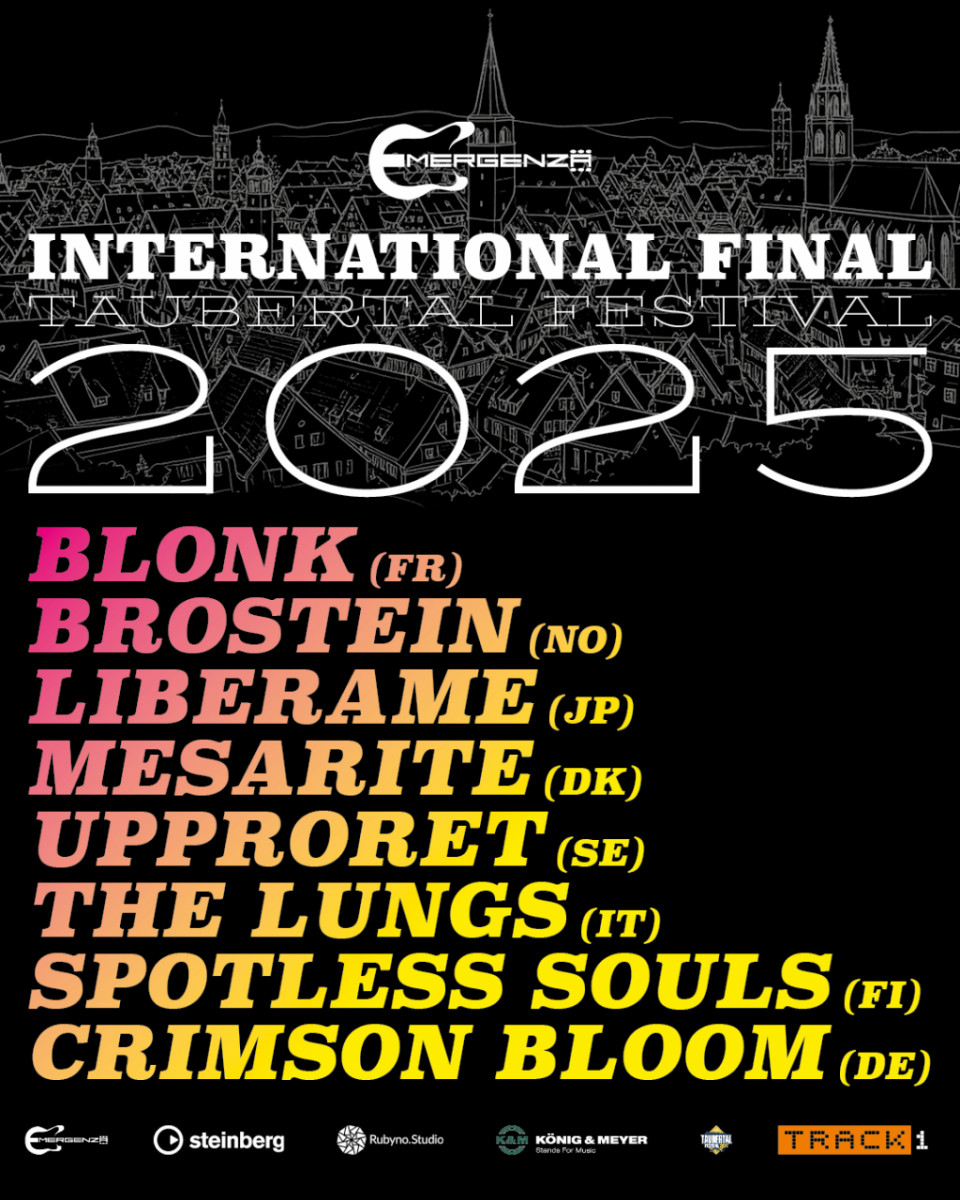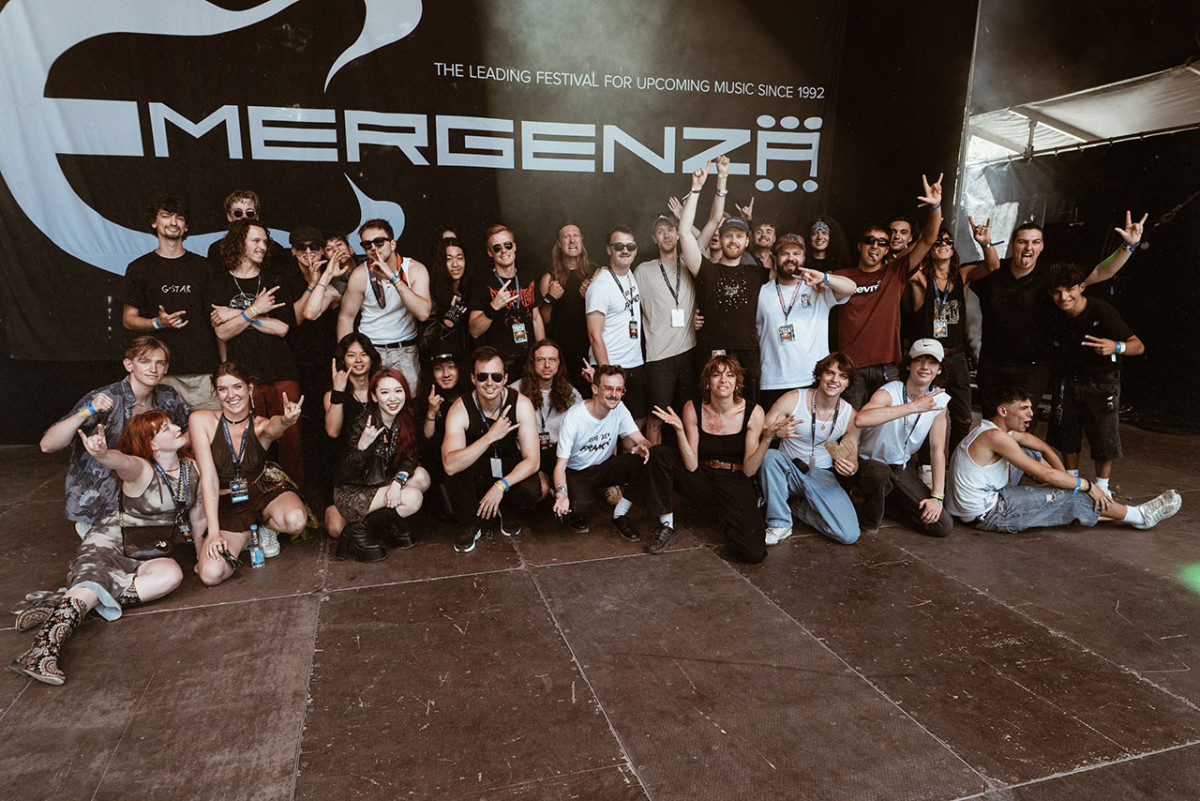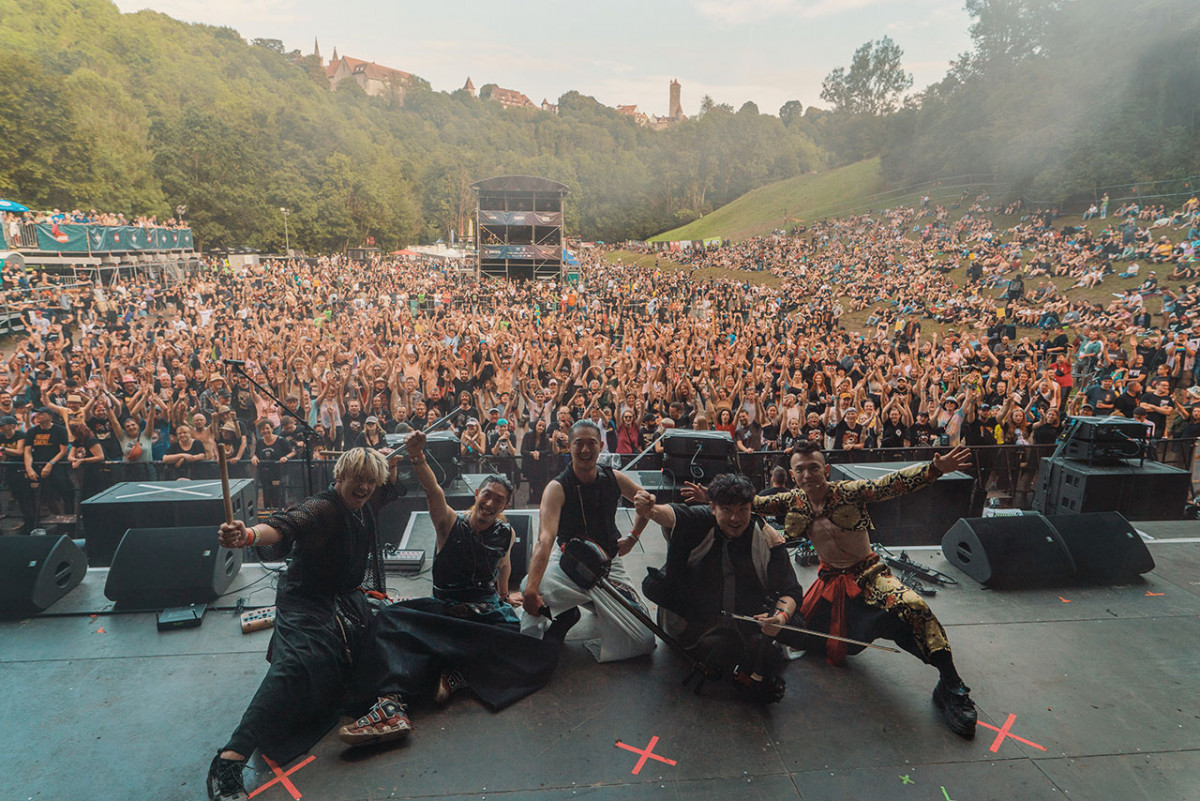News
Crimson Bloom from Germany wins the Emergenza Festival 2025 international final
A weekend focused on LIVE music, togetherness, having a lot of fun, making new friends, and creating memories for life!
The eagerly awaited finals of the 2025 Emergenza competition recently took place in the picturesque Tauber Valley, and the German band Crimson Bloom prevailed in a thrilling battle against numerous talented participants. They captivated the audience with good songs and an energetic performance that convinced the jury, earning them a well-deserved first place. As part of the main prize, Crimson Bloom played a second time on the festival, but this time at the main stage of the Taubertal Festival. They shared the stage with bands and artists who also performed at the festival, including Papa Roach, Nothing But Thieves, and Yungblud.
Sharing the Sounds For Nature stage with Crimson Bloom were the other international finalists, who all of them, also played their biggest concert so far in their career: Brostein from Norway, The lungs from Italy, Upproret from Sweden, Blonk from France, Mesarite from Denmark, Spotless Souls from Finland, LiberaMe from Japan.
The 2025 Emergenza Final was not just a competition, but also a celebration of music and talent. With their victory, the band Crimson Bloom has cemented their place in the music scene, and we can't wait to see what the future holds for them. The other bands also demonstrated their potential to make a name for themselves in the music landscape. It was an unforgettable weekend that celebrated the passion for live music and the talents of the next generation of artists.
Now it's YOUR turn! Sign up on our home page, and you will be next to play your best concerts in some of the best clubs.
Photo by Kalle Kervinen
Sharing the Sounds For Nature stage with Crimson Bloom were the other international finalists, who all of them, also played their biggest concert so far in their career: Brostein from Norway, The lungs from Italy, Upproret from Sweden, Blonk from France, Mesarite from Denmark, Spotless Souls from Finland, LiberaMe from Japan.
The 2025 Emergenza Final was not just a competition, but also a celebration of music and talent. With their victory, the band Crimson Bloom has cemented their place in the music scene, and we can't wait to see what the future holds for them. The other bands also demonstrated their potential to make a name for themselves in the music landscape. It was an unforgettable weekend that celebrated the passion for live music and the talents of the next generation of artists.
Now it's YOUR turn! Sign up on our home page, and you will be next to play your best concerts in some of the best clubs.
Photo by Kalle Kervinen
News / DE
Emergenza World Final at Taubertal Festival 2025: A Celebration of Emerging Talent
Here's a sneak peek at the lineup for this year's Emergenza World Final at Taubertal Festival
The 2025 edition of the Emergenza World Final at the legendary Taubertal Festival is shaping up to be an extraordinary showcase of emerging talent from around the globe. This year, music fans are in for an electrifying weekend filled with innovative sounds, vibrant performances, and the chance to witness the future of new music. The Emergenza World Final promises an exciting line-up, with bands from all over the world coming together to compete for the coveted title. Here’s everything you need to know about the lineup and the festival’s highlights.
The Taubertal Festival has been a hub for international music acts for years, and in 2025, the spotlight will be on the Emergenza World Final - a platform where the best up-and-coming bands across various genres will battle it out for recognition. With a combination of established acts and fresh talent, this year’s festival promises something for every music enthusiast.
Friday 08 Aug, Line-Up:
14:15 - Corduroy County - Special Guest, not part of the contest
Instagram: corduroycountymusic
Kicking off the festivities with a special guest performance, Corduroy County brings their signature blend of up-to-date indie pop to the stage. With a sound that feels both timeless and fresh, their acoustic melodies and heartfelt lyrics set the tone for the weekend’s high-energy performances.
14:40 - Bostein, Norway
Instagram: brosteinofficial
Hailing from Norway, Bostein brings a fiery and intense metal sound. Their high-octane performances are a must-see for fans of hard-hitting metal and powerful vocals. Expect a performance that will make the crowd roar with energy.
16:55 - The Lungs, Italy
Instagram: thelungsband
The Lungs play a unique mix of indie, alternative, and post-punk influences. Their atmospheric soundscapes and engaging stage presence are sure to captivate audiences and keep them on their toes.
18:55 - Upproret, Sweden
Instagram: upproretmusik
Upproret brings the perfect blend of Swedish punk and hard rock to the stage. Their raw energy and unapologetic attitude will electrify the festival grounds, and their explosive live shows have earned them a loyal fanbase.
21:05 - Crimson Bloom, Germany
Instagram: crimson.bloom
Finishing the day with a bang, Crimson Bloom is ready to close out the evening with a sound that blends alternative rock, pop sensibility, and raw live energy.. Their haunting melodies and emotive lyrics promise to leave a lasting impression on the audience.
Saturday 09 Aug, Line-Up:
15:30 - Blonk, France
Instagram: blonk.music
From France, Blonk brings an experimental approach to indie rock, characterized by complex rhythms and intricate melodies. Their sound is as distinctive as it is captivating, drawing influences from funk and alternative music to create something entirely new.
16:10 - Mesarite, Denmark
Instagram: mesa.rite
MesaRite from Denmark is known for blending intricate metal arrangements with atmospheric, almost ambient passages. Their technical prowess and deep, heavy sound will have fans headbanging from start to finish.
16:50 - Spotless Souls, Finland
Instagram: spotless.souls
Spotless Souls is a Finnish band that combines indie with melodic and progressive elements. Their sound is characterized by strong guitar riffs, emotive lyrics, and an engaging stage presence that has captivated fans in their home country.
17:30 - LiberaMe, Japan
Instagram: liberameofficial
LiberaMe brings an eclectic fusion of rock and metal with influences from Japan's unique musical heritage. Their performances are known for their tight musicianship and thrilling energy, making them a standout act on this global stage.
Why Attend the Emergenza World Final?
A Truly Global Experience: Bands from across Europe, the Nordics, and Asia, are showcasing their talent, bringing diverse sounds and styles that reflect the global nature of the music scene today.
Discover the Future of Music: The Emergenza World Final is known for launching the careers of some of the most exciting new acts in rock, metal, and indie music. Be part of the experience before these bands hit the big time.
Electric Atmosphere: The energy at the Taubertal Festival is always palpable, and with so many talented acts, the competition will be fierce. Expect plenty of excitement, powerful performances, and unforgettable moments.
Don’t miss the chance to witness the next big thing in the music world at the Emergenza World Final during the Taubertal Festival 2025! Whether you’re a fan of hard rock, punk, metal, or indie, this is a festival that guarantees to deliver unforgettable performances and showcase the best up-and-coming talent from across the globe. See you there!
The Taubertal Festival has been a hub for international music acts for years, and in 2025, the spotlight will be on the Emergenza World Final - a platform where the best up-and-coming bands across various genres will battle it out for recognition. With a combination of established acts and fresh talent, this year’s festival promises something for every music enthusiast.
Friday 08 Aug, Line-Up:
14:15 - Corduroy County - Special Guest, not part of the contest
Instagram: corduroycountymusic
Kicking off the festivities with a special guest performance, Corduroy County brings their signature blend of up-to-date indie pop to the stage. With a sound that feels both timeless and fresh, their acoustic melodies and heartfelt lyrics set the tone for the weekend’s high-energy performances.
14:40 - Bostein, Norway
Instagram: brosteinofficial
Hailing from Norway, Bostein brings a fiery and intense metal sound. Their high-octane performances are a must-see for fans of hard-hitting metal and powerful vocals. Expect a performance that will make the crowd roar with energy.
16:55 - The Lungs, Italy
Instagram: thelungsband
The Lungs play a unique mix of indie, alternative, and post-punk influences. Their atmospheric soundscapes and engaging stage presence are sure to captivate audiences and keep them on their toes.
18:55 - Upproret, Sweden
Instagram: upproretmusik
Upproret brings the perfect blend of Swedish punk and hard rock to the stage. Their raw energy and unapologetic attitude will electrify the festival grounds, and their explosive live shows have earned them a loyal fanbase.
21:05 - Crimson Bloom, Germany
Instagram: crimson.bloom
Finishing the day with a bang, Crimson Bloom is ready to close out the evening with a sound that blends alternative rock, pop sensibility, and raw live energy.. Their haunting melodies and emotive lyrics promise to leave a lasting impression on the audience.
Saturday 09 Aug, Line-Up:
15:30 - Blonk, France
Instagram: blonk.music
From France, Blonk brings an experimental approach to indie rock, characterized by complex rhythms and intricate melodies. Their sound is as distinctive as it is captivating, drawing influences from funk and alternative music to create something entirely new.
16:10 - Mesarite, Denmark
Instagram: mesa.rite
MesaRite from Denmark is known for blending intricate metal arrangements with atmospheric, almost ambient passages. Their technical prowess and deep, heavy sound will have fans headbanging from start to finish.
16:50 - Spotless Souls, Finland
Instagram: spotless.souls
Spotless Souls is a Finnish band that combines indie with melodic and progressive elements. Their sound is characterized by strong guitar riffs, emotive lyrics, and an engaging stage presence that has captivated fans in their home country.
17:30 - LiberaMe, Japan
Instagram: liberameofficial
LiberaMe brings an eclectic fusion of rock and metal with influences from Japan's unique musical heritage. Their performances are known for their tight musicianship and thrilling energy, making them a standout act on this global stage.
Why Attend the Emergenza World Final?
A Truly Global Experience: Bands from across Europe, the Nordics, and Asia, are showcasing their talent, bringing diverse sounds and styles that reflect the global nature of the music scene today.
Discover the Future of Music: The Emergenza World Final is known for launching the careers of some of the most exciting new acts in rock, metal, and indie music. Be part of the experience before these bands hit the big time.
Electric Atmosphere: The energy at the Taubertal Festival is always palpable, and with so many talented acts, the competition will be fierce. Expect plenty of excitement, powerful performances, and unforgettable moments.
Don’t miss the chance to witness the next big thing in the music world at the Emergenza World Final during the Taubertal Festival 2025! Whether you’re a fan of hard rock, punk, metal, or indie, this is a festival that guarantees to deliver unforgettable performances and showcase the best up-and-coming talent from across the globe. See you there!
News / DE
What should Up-and-Coming Bands and Artists Focus On in 2025?
This vision of success shifts the focus back to what truly matters: creating music that resonates and building a dedicated community around it.
As we enter 2025, the music industry continues to evolve, and so do the measures of success for up-and-coming bands and artists. Gone are the days when record sales or radio play were the ultimate indicators of an artist's popularity. Even streaming numbers and social media followers once heralded as modern benchmarks are no longer reliable gauges, thanks to widespread manipulation and bot-driven metrics. So, what should emerging artists realistically focus on to establish themselves and thrive in the industry?
The answer lies in authenticity, direct fan engagement, and measurable support from a loyal audience. Here's what realistic success will look like for musicians in 2025.
1. Live Performance as the main Core Metric
In 2025, the live music industry will remain one of the most reliable indicators of an artist's true demand. For up-and-coming artists, the ability to sell tickets, fill venues, and scale up to larger stages over time is proof of genuine fan interest. Even modest but consistently increasing ticket sales in small venues can set a solid foundation. Packed shows are a testament to an artist’s ability to connect with audiences in ways that streams or likes cannot replicate.
2. Merchandise Sales: Proof of Fan Dedication
In relation to live concerts, merchandise sales provide another key insight into fan loyalty. Fans willing to spend money on T-shirts, vinyl, or exclusive signed items demonstrate a level of commitment that goes beyond casual interest. Platforms that empower direct-to-fan sales, like Bandcamp or Shopify, will continue to be instrumental for emerging artists to track and grow their dedicated fanbase.
3. Engagement Quality Over Vanity Metrics
Social media remains an essential tool for artists, but by 2025, the focus will shift from follower counts to the quality of engagement. Metrics like comments, shares, and direct messages reveal much more about a fanbase than likes or views. Additionally, user-generated content such as fan-made TikToks, covers, or creative posts about an artist’s music will serve as a clear sign of cultural resonance and authentic reach.
4. Direct Fan Support Platforms
Subscription-based platforms like Patreon, where fans directly support artists, are becoming increasingly popular. By offering behind-the-scenes content, early releases, or personal interactions, musicians can create sustainable revenue while cultivating a sense of community. Similarly, crowdfunding campaigns for albums or tours show tangible support from fans willing to invest in an artist’s success.
5. Leaning Into Analytics and Independent Data
Independent data platforms like Bandsintown, Songkick, and Spotify Wrapped are invaluable for tracking fan engagement. Artists should focus on metrics such as playlist inclusions, repeat listens, or live event RSVPs, which offer transparent insights into their growth.
6. Cultural Impact Over Instant Virality
Instead of chasing fleeting viral moments, up-and-coming artists should aim to make meaningful cultural impacts. Whether through thought-provoking music, community involvement, or creative projects, these efforts create long-term relevance and loyalty.
The Future is Authentic
For emerging artists in 2025, the path to success lies not in inflated metrics but in cultivating genuine connections with fans. By prioritizing live performances, merchandise sales, quality engagement, and direct fan support, artists can build a sustainable and authentic career. Success will be defined not by the size of a social media following, but by the strength of the relationships artists build with their audience.
If you are ready to build a true and direct connection with your fanbase then sign up to participate in the Emergenza Festival, which will provide you with a platform where you can achieve just that!
The answer lies in authenticity, direct fan engagement, and measurable support from a loyal audience. Here's what realistic success will look like for musicians in 2025.
1. Live Performance as the main Core Metric
In 2025, the live music industry will remain one of the most reliable indicators of an artist's true demand. For up-and-coming artists, the ability to sell tickets, fill venues, and scale up to larger stages over time is proof of genuine fan interest. Even modest but consistently increasing ticket sales in small venues can set a solid foundation. Packed shows are a testament to an artist’s ability to connect with audiences in ways that streams or likes cannot replicate.
2. Merchandise Sales: Proof of Fan Dedication
In relation to live concerts, merchandise sales provide another key insight into fan loyalty. Fans willing to spend money on T-shirts, vinyl, or exclusive signed items demonstrate a level of commitment that goes beyond casual interest. Platforms that empower direct-to-fan sales, like Bandcamp or Shopify, will continue to be instrumental for emerging artists to track and grow their dedicated fanbase.
3. Engagement Quality Over Vanity Metrics
Social media remains an essential tool for artists, but by 2025, the focus will shift from follower counts to the quality of engagement. Metrics like comments, shares, and direct messages reveal much more about a fanbase than likes or views. Additionally, user-generated content such as fan-made TikToks, covers, or creative posts about an artist’s music will serve as a clear sign of cultural resonance and authentic reach.
4. Direct Fan Support Platforms
Subscription-based platforms like Patreon, where fans directly support artists, are becoming increasingly popular. By offering behind-the-scenes content, early releases, or personal interactions, musicians can create sustainable revenue while cultivating a sense of community. Similarly, crowdfunding campaigns for albums or tours show tangible support from fans willing to invest in an artist’s success.
5. Leaning Into Analytics and Independent Data
Independent data platforms like Bandsintown, Songkick, and Spotify Wrapped are invaluable for tracking fan engagement. Artists should focus on metrics such as playlist inclusions, repeat listens, or live event RSVPs, which offer transparent insights into their growth.
6. Cultural Impact Over Instant Virality
Instead of chasing fleeting viral moments, up-and-coming artists should aim to make meaningful cultural impacts. Whether through thought-provoking music, community involvement, or creative projects, these efforts create long-term relevance and loyalty.
The Future is Authentic
For emerging artists in 2025, the path to success lies not in inflated metrics but in cultivating genuine connections with fans. By prioritizing live performances, merchandise sales, quality engagement, and direct fan support, artists can build a sustainable and authentic career. Success will be defined not by the size of a social media following, but by the strength of the relationships artists build with their audience.
If you are ready to build a true and direct connection with your fanbase then sign up to participate in the Emergenza Festival, which will provide you with a platform where you can achieve just that!
News / SE
Start a band!
You can always go solo later, so why not start a band and embark on an unforgettable journey together!
Starting a career in music is a dream for many, but the path to success can be fraught with challenges and uncertainties. For aspiring musicians, choosing between embarking on this journey as a solo artist or starting a band is a significant decision. While both routes have their merits, forming a band offers several advantages that can make the journey more rewarding and sustainable.
First and foremost, starting a band provides a collaborative environment that can enhance creativity. When multiple musicians come together, each brings unique perspectives, skills, and ideas to the table. This diversity can lead to more innovative and dynamic music compared to what a solo artist might produce alone. The synergy of a band often results in a richer sound and more complex arrangements, as members build on each other's strengths and compensate for each other's weaknesses.
Moreover, being in a band offers emotional and practical support. The music industry is notoriously tough, with countless hurdles such as financial pressures, industry gatekeepers, and the need for constant self-promotion. Navigating these challenges alone can be overwhelming. In a band, members can share the workload, providing emotional support and practical assistance. This camaraderie can be crucial in maintaining motivation and resilience, reducing the risk of burnout that many solo artists face.
From a logistical standpoint, a band can manage tasks more efficiently. Responsibilities such as booking gigs, managing social media, and handling finances can be divided among members. This division of labor allows each person to focus more on their strengths and less on the overwhelming array of tasks that come with a solo career. Additionally, having multiple members often means a wider network of contacts and opportunities, as each person brings their own connections and resources.
Furthermore, bands often have a stronger stage presence and more engaging live performances. The energy and interaction between band members can create a more captivating and memorable experience for audiences. This dynamic performance quality can help build a loyal fanbase more quickly than a solo act might be able to.
Lastly, the collective identity of a band can sometimes be more appealing to fans and industry professionals. Bands often present a united front that can be marketed more effectively. The group's name, image, and brand become a collaborative effort, resonating with a wider audience and often leading to more significant promotional opportunities.
In conclusion, while starting a career as a solo artist offers its own unique set of opportunities, the collaborative, supportive, and dynamic nature of a band makes it a compelling choice for many musicians. By sharing the creative process, supporting each other through challenges, and leveraging collective strengths, a band can navigate the complexities of the music industry more effectively and enjoy a more enriching musical journey.
When you are ready to take the next step make sure to sign up here on the page to participate in the Emergenza Festival, where you will play some of your best concerts in great venues, expanding your LIVE-fanbase and meeting fellow musicians along the way.
See you on stage!
First and foremost, starting a band provides a collaborative environment that can enhance creativity. When multiple musicians come together, each brings unique perspectives, skills, and ideas to the table. This diversity can lead to more innovative and dynamic music compared to what a solo artist might produce alone. The synergy of a band often results in a richer sound and more complex arrangements, as members build on each other's strengths and compensate for each other's weaknesses.
Moreover, being in a band offers emotional and practical support. The music industry is notoriously tough, with countless hurdles such as financial pressures, industry gatekeepers, and the need for constant self-promotion. Navigating these challenges alone can be overwhelming. In a band, members can share the workload, providing emotional support and practical assistance. This camaraderie can be crucial in maintaining motivation and resilience, reducing the risk of burnout that many solo artists face.
From a logistical standpoint, a band can manage tasks more efficiently. Responsibilities such as booking gigs, managing social media, and handling finances can be divided among members. This division of labor allows each person to focus more on their strengths and less on the overwhelming array of tasks that come with a solo career. Additionally, having multiple members often means a wider network of contacts and opportunities, as each person brings their own connections and resources.
Furthermore, bands often have a stronger stage presence and more engaging live performances. The energy and interaction between band members can create a more captivating and memorable experience for audiences. This dynamic performance quality can help build a loyal fanbase more quickly than a solo act might be able to.
Lastly, the collective identity of a band can sometimes be more appealing to fans and industry professionals. Bands often present a united front that can be marketed more effectively. The group's name, image, and brand become a collaborative effort, resonating with a wider audience and often leading to more significant promotional opportunities.
In conclusion, while starting a career as a solo artist offers its own unique set of opportunities, the collaborative, supportive, and dynamic nature of a band makes it a compelling choice for many musicians. By sharing the creative process, supporting each other through challenges, and leveraging collective strengths, a band can navigate the complexities of the music industry more effectively and enjoy a more enriching musical journey.
When you are ready to take the next step make sure to sign up here on the page to participate in the Emergenza Festival, where you will play some of your best concerts in great venues, expanding your LIVE-fanbase and meeting fellow musicians along the way.
See you on stage!
News / SE
Why focusing solely on Spotify won't kickstart your band's career
A diversified approach with the main focus on building your LIVE fanbase will prove more successful
In the digital age, aspiring musicians often see Spotify as the holy grail of music distribution. It's the world's most popular music streaming platform, boasting millions of users and an extensive library of songs. Many up-and-coming artists believe that by releasing their music exclusively on Spotify, they can quickly catapult their careers to stardom. However, the reality is far more complex. While Spotify can be a valuable tool for musicians, relying solely on this platform to kickstart your band's career is a risky strategy for several reasons.
1. Oversaturation of the Market:
One of the most significant challenges artists face on Spotify is the intense competition. With upwards of a hundred thousand new songs uploaded daily, it's challenging to stand out. A band might release an amazing track, but it can easily get lost in the vast sea of music. To succeed, musicians need more than just great music they need a well-thought-out marketing strategy that extends beyond Spotify.
2. Limited Income from Streaming:
While Spotify provides exposure, it often yields limited income, especially for smaller, independent bands. The platform's payout rates per stream are notoriously low, and with fierce competition among the streaming platforms, user subscription fees will remain low for the foreseeable future which will keep payouts to musicians at a low level. Relying solely on Spotify for income can make it challenging to sustain a music career, invest in equipment, or finance future projects.
3. Diversification is Key:
Focusing exclusively on Spotify ignores the power of diversification in the music industry. Successful artists understand that they must utilize multiple platforms and revenue streams. This includes performing live, selling merchandise, and engaging with fans on social media. Building a holistic brand and presence across various channels is crucial for long-term success.
4. The Importance of Live Shows:
Live performances remain the most vital component of a musician's career. While streaming platforms provide a global audience, nothing beats the connection forged at a live concert. Touring allows bands to interact with fans, build a dedicated following, and generate revenue from ticket sales, merchandising, and other associated activities.
5. Building a Fanbase:
To create a lasting career, it's essential to build a dedicated LIVE fanbase that goes beyond passive Spotify listeners. Interacting with fans at concerts, engaging on social media, and nurturing a community of supporters are all part of this process. A strong LIVE fanbase is the backbone of a band's success, leading to long-term sustainability.
6. The Role of Record Labels:
For many emerging artists and bands that have built their own LIVE fanbase, working with a record label can provide the resources, guidance, and industry connections that are often hard to come by when you are ready to take things to the next level. Labels can assist with promotion, distribution, and funding, helping to boost a band's career in ways that Spotify alone cannot.
In conclusion, while Spotify is undoubtedly a valuable tool for musicians, relying solely on it is not a recipe for success. The music industry is multifaceted, and a successful career in music requires a multifaceted approach. Bands should consider diversifying their revenue streams, focusing on building a LIVE fanbase by engaging in live performances. Furthermore, as the next step, the support of a record label can provide opportunities that are hard to achieve independently. By recognizing the limitations of Spotify and embracing a more comprehensive strategy, emerging bands can increase their chances of achieving their musical dreams and sustaining a long and prosperous career.
1. Oversaturation of the Market:
One of the most significant challenges artists face on Spotify is the intense competition. With upwards of a hundred thousand new songs uploaded daily, it's challenging to stand out. A band might release an amazing track, but it can easily get lost in the vast sea of music. To succeed, musicians need more than just great music they need a well-thought-out marketing strategy that extends beyond Spotify.
2. Limited Income from Streaming:
While Spotify provides exposure, it often yields limited income, especially for smaller, independent bands. The platform's payout rates per stream are notoriously low, and with fierce competition among the streaming platforms, user subscription fees will remain low for the foreseeable future which will keep payouts to musicians at a low level. Relying solely on Spotify for income can make it challenging to sustain a music career, invest in equipment, or finance future projects.
3. Diversification is Key:
Focusing exclusively on Spotify ignores the power of diversification in the music industry. Successful artists understand that they must utilize multiple platforms and revenue streams. This includes performing live, selling merchandise, and engaging with fans on social media. Building a holistic brand and presence across various channels is crucial for long-term success.
4. The Importance of Live Shows:
Live performances remain the most vital component of a musician's career. While streaming platforms provide a global audience, nothing beats the connection forged at a live concert. Touring allows bands to interact with fans, build a dedicated following, and generate revenue from ticket sales, merchandising, and other associated activities.
5. Building a Fanbase:
To create a lasting career, it's essential to build a dedicated LIVE fanbase that goes beyond passive Spotify listeners. Interacting with fans at concerts, engaging on social media, and nurturing a community of supporters are all part of this process. A strong LIVE fanbase is the backbone of a band's success, leading to long-term sustainability.
6. The Role of Record Labels:
For many emerging artists and bands that have built their own LIVE fanbase, working with a record label can provide the resources, guidance, and industry connections that are often hard to come by when you are ready to take things to the next level. Labels can assist with promotion, distribution, and funding, helping to boost a band's career in ways that Spotify alone cannot.
In conclusion, while Spotify is undoubtedly a valuable tool for musicians, relying solely on it is not a recipe for success. The music industry is multifaceted, and a successful career in music requires a multifaceted approach. Bands should consider diversifying their revenue streams, focusing on building a LIVE fanbase by engaging in live performances. Furthermore, as the next step, the support of a record label can provide opportunities that are hard to achieve independently. By recognizing the limitations of Spotify and embracing a more comprehensive strategy, emerging bands can increase their chances of achieving their musical dreams and sustaining a long and prosperous career.
News / SE
Emergenza 2023 Final at the Taubertal Festival
A Global Music Showcase and TRAinnovation's Triumph
The Emergenza Final at the Taubertal Festival was a vibrant musical spectacle that transcended borders and celebrated independent talent from around the world. Eight bands from different corners of Europe and Asia, each bringing their unique sound to the stage, transformed Taubertal into a melting pot of musical diversity. The highlight of the weekend was the sensational victory of TRAinnovation from Japan, whose performance left an indelible mark on the audience.
The Rock Boy, FR: The final kicked off with The Rock Boy from France, delivering a powerful dose of rock 'n' roll. Their energetic performance set the tone for the night, with catchy riffs and dynamic stage presence that got the crowd on their feet.
Afternoon Astronauts, FI: Hailing from Finland, Afternoon Astronauts took the audience on a cosmic journey with their powerful glam rock sounds. Their melodies and atmospheres created a captivating sonic experience that left a lasting impression.
Grell, DE: Germany's own Grell brought a heavy dose of gritty rock to the stage. Their raw and passionate performance resonated with the rock aficionados in the audience, and their charismatic lead singer commanded attention throughout their set.
Indra, IT: Italy's Indra introduced a touch of Mediterranean flair with their blend of rock and pop. Their infectious melodies and charismatic frontwoman won over the crowd, creating a vibrant atmosphere that had everyone dancing.
Oscar Kusko, SE: Sweden's Oscar Kusko brought his soulful and heartfelt indie tunes to the stage. His emotionally charged performance resonated deeply with the audience, providing a soulful interlude in the midst of the rock-centric lineup.
Catch The Fox, NO: Norway's Catch The Fox injected a dose of high-energy pop into the mix. Their catchy hooks and infectious beats had the crowd singing along and dancing throughout their set, creating an electric atmosphere.
Wojtek, DK: Denmark's Wojtek delivered a sonic assault of heavy rock and metal. Their thunderous riffs and headbanging performance shook Taubertal, showcasing their undeniable prowess in the genre.
The culmination of the final was the crowning of the Emergenza champion, TRAinnovation from Japan. Their performance was nothing short of a revelation, combining intricate instrumentals, electrifying energy, and an otherworldly stage presence. TRAinnovation's fusion of traditional music and electronic elements created a sonic landscape that transported the audience to another dimension. Their victory was well-deserved and marked a significant moment in the event, showcasing the global reach and appeal of Emergenza.
The Emergenza Final at Taubertal was a testament to the power of music to unite and inspire. It celebrated the rich tapestry of musical genres and talents from around the world, and TRAinnovation's win was a shining example of the event's mission to elevate independent artists onto the global stage. The final was a musical journey that left everyone in attendance eagerly anticipating the next wave of emerging talent.
The Rock Boy, FR: The final kicked off with The Rock Boy from France, delivering a powerful dose of rock 'n' roll. Their energetic performance set the tone for the night, with catchy riffs and dynamic stage presence that got the crowd on their feet.
Afternoon Astronauts, FI: Hailing from Finland, Afternoon Astronauts took the audience on a cosmic journey with their powerful glam rock sounds. Their melodies and atmospheres created a captivating sonic experience that left a lasting impression.
Grell, DE: Germany's own Grell brought a heavy dose of gritty rock to the stage. Their raw and passionate performance resonated with the rock aficionados in the audience, and their charismatic lead singer commanded attention throughout their set.
Indra, IT: Italy's Indra introduced a touch of Mediterranean flair with their blend of rock and pop. Their infectious melodies and charismatic frontwoman won over the crowd, creating a vibrant atmosphere that had everyone dancing.
Oscar Kusko, SE: Sweden's Oscar Kusko brought his soulful and heartfelt indie tunes to the stage. His emotionally charged performance resonated deeply with the audience, providing a soulful interlude in the midst of the rock-centric lineup.
Catch The Fox, NO: Norway's Catch The Fox injected a dose of high-energy pop into the mix. Their catchy hooks and infectious beats had the crowd singing along and dancing throughout their set, creating an electric atmosphere.
Wojtek, DK: Denmark's Wojtek delivered a sonic assault of heavy rock and metal. Their thunderous riffs and headbanging performance shook Taubertal, showcasing their undeniable prowess in the genre.
The culmination of the final was the crowning of the Emergenza champion, TRAinnovation from Japan. Their performance was nothing short of a revelation, combining intricate instrumentals, electrifying energy, and an otherworldly stage presence. TRAinnovation's fusion of traditional music and electronic elements created a sonic landscape that transported the audience to another dimension. Their victory was well-deserved and marked a significant moment in the event, showcasing the global reach and appeal of Emergenza.
The Emergenza Final at Taubertal was a testament to the power of music to unite and inspire. It celebrated the rich tapestry of musical genres and talents from around the world, and TRAinnovation's win was a shining example of the event's mission to elevate independent artists onto the global stage. The final was a musical journey that left everyone in attendance eagerly anticipating the next wave of emerging talent.
News / DE





